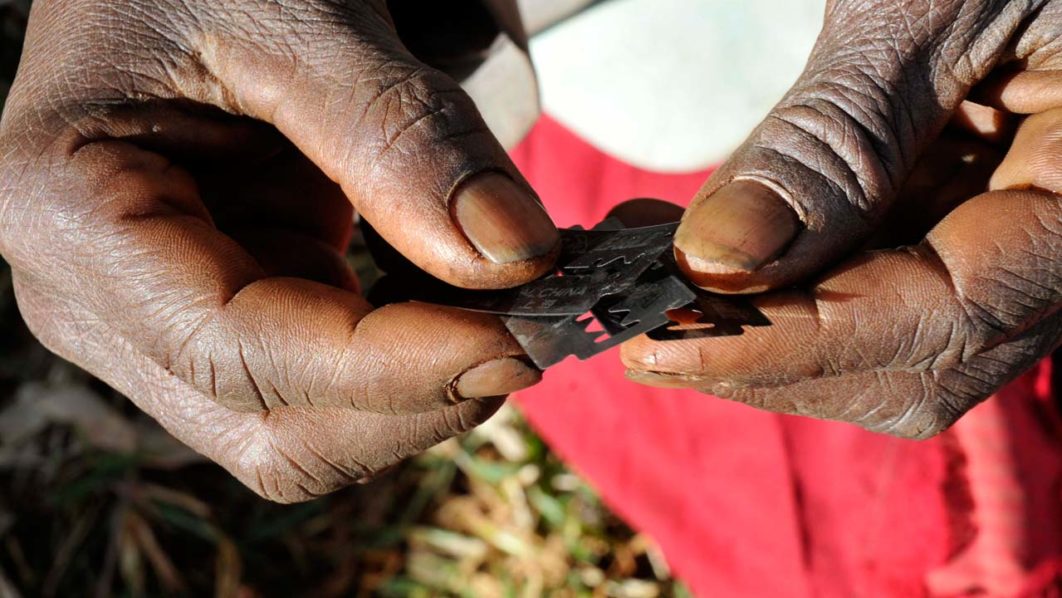Amongst other things I learnt from Ngugi wa Thiong’o’s “The River Between”, it is the fact that female genital mutilation is a death trap.
The debate on female genital mutilation has gone on for too long and is deeply rooted in gender inequality. It will, therefore, be misleading to state that that cultural flaw has been totally obliterated. No, it has not!
It even pains me to write that Female Genital Mutilation (FGM) or simply female circumcision is the cutting or removal of some or all of the external female genitalia – practiced in Africa, Asia and the Middle East. But I guess you have to understand the intensity of my discomfort.
It is a procedure carried out by a traditional circumciser – with a blade – days after birth to adolescence and maybe beyond.
The blade, usually used for every one of the ‘candidates’ are used to remove clitoral hood and clitoral glans; removal of the inner labia; and removal of the inner and outer labia and closure of the vulva. A small hole is left for the passage of urine and menstrual fluid; the vagina is opened for intercourse and opened further for childbirth.
The debate on female genital mutilation has gone on for too long and is deeply rooted in gender inequality. It will, therefore, be misleading to state that that cultural flaw has been totally obliterated. No, it has not!
It even pains me to write that Female Genital Mutilation (FGM) or simply female circumcision is the cutting or removal of some or all of the external female genitalia – practiced in Africa, Asia and the Middle East. But I guess you have to understand the intensity of my discomfort.
It is a procedure carried out by a traditional circumciser – with a blade – days after birth to adolescence and maybe beyond.
The blade, usually used for every one of the ‘candidates’ are used to remove clitoral hood and clitoral glans; removal of the inner labia; and removal of the inner and outer labia and closure of the vulva. A small hole is left for the passage of urine and menstrual fluid; the vagina is opened for intercourse and opened further for childbirth.
 |
| Female Genital Mutilation. Photo: Public Radio Internationa) |
It is a cultural practice that uses the excuse of purity, humility, beauty and formal passage to womanhood as its excuse. This explanation usually disingenuously opens the minds of women, who see it as honourable. Therefore, uninformed parents (no offence intended) are usually of the opinion that uncut girls will only be socially excluded.
Indeed, we cannot ignore the fact that the cultural anomaly has reduced to an insignificant level and has been greatly opposed all around the world; however, we must also remember that our society has sprinkles of socio-cultural extremists, who will argue that “our cultural practices cannot be erased all because the Western world introduced their own culture”. Common!
It was even a step in the right direction to rechristen it “female genital mutilation” because there has been no better way of defining a slow-witted exercise that opens up a woman for more harm than good. And is, unarguably, an extreme form of gender inequality.
From a human rights and health perspective, FGM poses great risk to women and while I will like to list and explain all I know on the health risks, I will only list them to include: severe pain, excessive bleeding, shock, genital tissue swelling, genital infections, HIV/AIDS, urination problems, psychological imbalance, prolonged reproductive tract infections, menstruation problems, faulty sexual health and death.
Culture is an important aspect of a society; yet, practices like FGM are nothing but fundamentally damaging and must be totally annihilated.
Indeed, we cannot ignore the fact that the cultural anomaly has reduced to an insignificant level and has been greatly opposed all around the world; however, we must also remember that our society has sprinkles of socio-cultural extremists, who will argue that “our cultural practices cannot be erased all because the Western world introduced their own culture”. Common!
It was even a step in the right direction to rechristen it “female genital mutilation” because there has been no better way of defining a slow-witted exercise that opens up a woman for more harm than good. And is, unarguably, an extreme form of gender inequality.
From a human rights and health perspective, FGM poses great risk to women and while I will like to list and explain all I know on the health risks, I will only list them to include: severe pain, excessive bleeding, shock, genital tissue swelling, genital infections, HIV/AIDS, urination problems, psychological imbalance, prolonged reproductive tract infections, menstruation problems, faulty sexual health and death.
Culture is an important aspect of a society; yet, practices like FGM are nothing but fundamentally damaging and must be totally annihilated.
Unlike other parts of the world, Nigeria only pays lip service to abandoning the practice – enlightenment is the only force that has encouraged people.
It is saddening that we do not have stringent legislation to curb the practice and so, many parents still subscribe to subjecting their daughters to such harmful traditional procedures.
If only we can join the campaign to say “NO” to save the future generations of women, then we can begin to save the lives of the numerous women, who are, indeed, indispensable members of the society.It goes beyond saying it, we have to be part of the opposition.
In this article:
